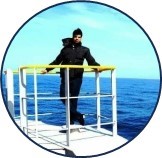OOW UK Orals Prep
.png)
Introduction
The maritime industry is a realm of challenges and responsibilities, where the safety of vessels, their crews, and the environment takes precedence and oral exams hold great significance for mariners as they are crucial assessment of their practical knowledge and decision-making abilities. These MCA oral exams allow mariners to demonstrate their competency in handling real-world situations at sea, such as navigation, safety, and emergency responses. Thus, successful preparation for orals exams is vital for mariners to advance in their careers and ensure the safety of crew, passengers, and the vessels they navigate. For in-depth insights into preparation strategies for the MCA UK COC oral exam, be sure to visit our blog titled “Your Ultimate Guide: MCA Oral Prep”.
For Officers of the Watch (OOW) in the UK, this commitment to safety is the cornerstone of their roles. The OOW UK COC oral examination, a significant milestone in their maritime careers, is a testament to their proficiency in safeguarding seafaring operations.
As an OOW, your utmost priority lies in ensuring the safe operation of the vessel. This entails a profound comprehension of your responsibilities, including when to seek help. Equally important is your proficiency in utilizing the organizational tools at your disposal, enabling you to respond appropriately to both routine and non-routine situations. Building upon that foundation, this blog serves as a continuation of our exploration, delving deeper into the preparation strategy and techniques specifically tailored for MCA OOW Orals.
In the UK Officer of the Watch (OOW) oral examination, candidates are expected to have a strong understanding of various critical maritime topics. The main areas to focus on include
- Navigation: You should be proficient in chartwork, electronic navigation systems, and the ability to plan and execute safe passages. Demonstrating your knowledge of navigational aids, such as radar and GPS, is crucial.
- Safety and Emergency Procedures: This includes a comprehensive understanding of safety regulations, the ability to handle emergency situations, knowledge of firefighting, damage control, and first aid procedures.
- International Regulations and Compliance: Familiarity with international maritime conventions and regulations, such as SOLAS (Safety of Life at Sea) and COLREGs (Collision Regulations).
- Meteorology: Understanding weather patterns, interpretation of weather reports, and the impact of weather conditions on navigation.
- Ship Stability: Knowledge of ship stability principles and the ability to calculate stability parameters to maintain the vessel's stability during various operational conditions.
- Rules of the Road (COLREGs): Proficiency in understanding and applying the COLREGs, which govern the rules for safe navigation at sea.
- Cargo Operations: Understanding cargo handling procedures, stowage, and securing, particularly for various types of cargo, and the safe loading and discharge of cargo.
- Bridge Resource Management (BRM): Proficiency in teamwork, effective communication, and decision-making while managing the bridge team during navigation and manoeuvring.
- Watchkeeping and Collision Avoidance: Understanding the principles of safe watchkeeping and techniques to avoid collisions at sea.
- Environmental Protection: Awareness of environmental regulations, including ballast water management and emissions reduction measures.
- Emergency Response Plans: Knowledge of the vessel's specific emergency response plans and your role in implementing them during various emergency scenarios.
- Shipboard Procedures: Understanding the procedures for various shipboard operations, including anchoring, mooring, and routine maintenance.
- Bridge Equipment and Technology: Familiarity with the use and operation of modern bridge equipment, such as ECDIS (Electronic Chart Display and Information System) and AIS (Automatic Identification System).
It's essential to thoroughly review the syllabus and guidelines provided by the UK Maritime and Coastguard Agency (MCA) or the relevant maritime authority for the most up-to-date and accurate information regarding the OOW oral examination. Proper preparation, study, and practice in these areas will increase your chances of success in the examination.
Feel free to check out our blogs for authentic information:-
If you are planning to apply for OOW UK COC,
If you are planning to apply for Chief Mate UK COC or
If you are planning to apply for Master UK COC
Conclusion:
In conclusion, the UK Officer of the Watch (OOW) oral examination serves as a critical milestone for maritime professionals, emphasizing their dedication to vessel safety and operational integrity. By mastering these essential domains, OOWs are better equipped to fulfill their roles, ensuring safe and efficient seafaring operations, and preserving the well-being of both crews and the environment.
However MCA orals preparation strategy differs from OOW to Chief Mate to Masters. In this blog, we discussed in detail about the preparation strategy for OOW orals. You may check out each of their specific strategy by clicking on the texts above. The comprehensive range of topics covered, from navigation to emergency response, underscores the multifaceted nature of their responsibilities. To succeed in examination, candidates must invest in thorough preparation, staying aligned with the latest guidelines from the MCA or relevant authorities.
If you're seeking a program to enhance your orals preparation with comprehensive guidance from experts and ongoing support, explore our MCA UK OOW Orals course. You can also take advantage of our complimentary course modules to gain a better insight into the teaching style and the content of the course.

Capt. Sherry
Captain Sherry, a distinguished Master Mariner (F.G) and renowned Maritime Trainer for Officers of the Watch (OOW), Chief Mates, and Masters, brings a wealth of expertise to the maritime industry. With a remarkable track record of instructing and guiding over a 3000+ successful written & oral aspirant, he is a stalwart in shaping the next generation of maritime professionals. As the visionary founder of DIGINAV & Author of www.deckoralsprep.com, he has revolutionized the field with his innovative solutions and unwavering commitment to safety, knowledge, and excellence on the high seas. Captain Sherry is a true luminary in the maritime world, dedicated to shaping the future of seafaring.
Teaching is neither a job, Nor a profession-It’s responsibility”.
Leave a comment
View more
Give your career a boost with S&B professional services.
CV Prep/EvaluationMore Jobs
Ship management
Mumbai
Electrical Superintendent
Ports and Pilotage
Mombasa, Kenya
AGM / DGM
Agency and Logistics
Dubai
Director Operations
Interview Prep/Mentoring
Find your polestar with the host of experts available on our platform
Know more

